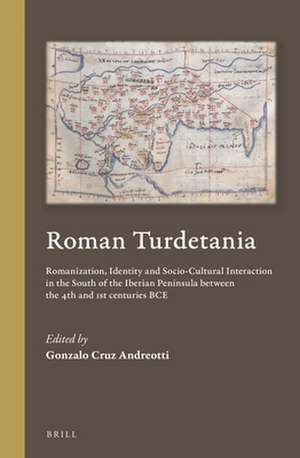Roman Turdetania: Romanization, Identity and Socio-Cultural Interaction in the South of the Iberian Peninsula between the 4th and 1st centuries BCE: Cultural Interactions in the Mediterranean, cartea 3
Editat de Gonzalo Cruz Andreottien Limba Engleză Hardback – 14 noi 2018
Preț: 680.67 lei
Preț vechi: 830.09 lei
-18% Nou
Puncte Express: 1021
Preț estimativ în valută:
130.29€ • 141.57$ • 109.51£
130.29€ • 141.57$ • 109.51£
Carte indisponibilă temporar
Doresc să fiu notificat când acest titlu va fi disponibil:
Se trimite...
Preluare comenzi: 021 569.72.76
Specificații
ISBN-13: 9789004373402
ISBN-10: 9004373403
Dimensiuni: 155 x 235 mm
Greutate: 0.52 kg
Editura: Brill
Colecția Brill
Seria Cultural Interactions in the Mediterranean
ISBN-10: 9004373403
Dimensiuni: 155 x 235 mm
Greutate: 0.52 kg
Editura: Brill
Colecția Brill
Seria Cultural Interactions in the Mediterranean
Cuprins
Preface: Spanish Turdetania, a Case Study for Shared IdentitiesGonzalo Cruz AndreottiList of Figures and TablesNotes on Contributors1 Strabo and the Invention of TurdetaniaGonzalo Cruz Andreotti2 Historians vs. Geographers: Divergent Uses of the Ethnic Name Turdetania in the Greek and Roman TraditionPierre Moret3 The City as a Structural Element in Turdetanian Identity in the Work of StraboEncarnación Castro- Páez4 Deconstructing ‘Turdetanian Culture’: Identities, Territories and ArchaeologyFrancisco José García Fernández5 Ethnic and Cultural Identity among Punic Communities in IberiaEduardo Ferrer Albelda6 Carthaginians in Turdetania: Carthaginian Presence in Iberia before 237 BCERuth Pliego Vázquez7 Tyrian Connections: Evolving Identities in the Punic WestManuel Álvarez Martí- Aguilar8 Unraveling the Western Phoenicians under Roman Rule: Identity, Heterogeneity and Dynamic BoundariesFrancisco Machuca Prieto9 Across the Looking Glass: Ethno- Cultural Identities in Southern Hispania through CoinageBartolomé Mora Serrano10 The Economy and Romanization of Hispania Ulterior (125– 25 BCE): The Role of the ItaliansEnrique García Vargas11 Epilogue: A New Paradigm for Romanization?Gonzalo Cruz AndreottiBibliographyIndex of Geographical NamesIndex LocorumIndex of Personal or Ethnics Names, and Conceptual Terms
Notă biografică
Gonzalo Cruz Andreotti is professor of ancient history at the University of Malaga. He has worked in several lines of research: ancient geographical thought, Iberian geography, ancient ethnic identities in Hispania – in particular concerning Turdetania- and more specifically, concrete studies on authors, such as Polybius and Strabo.Contributors are: Manuel Álvarez Martí-Aguilar, Encarnación Castro Páez, Gonzalo Cruz Andreotti, Eduardo Ferrer Albelda, Francisco José García Fernández, Enrique García Vargas, Francisco Machuca Prieto, Bartolomé Mora Serrano, Pierre Moret, Ruth Pliego Vázquez.
Recenzii
"Strabo famously praised the southern Spanish region of Turdetania as the most civilized of Iberia, a place where abundant resources, trade networks, and a well-developed urban tradition allowed quick integration into Rome’s growing empire (3.2.1–15). This perception has long permeated scholarship, but it is one that has been gradually reassessed in a growing corpus of Spanish work. This new edited volume presents these fresh perspectives on the romanization of Turdetania. Edited by Cruz Andreotti (University of Málaga) with contributions by nine other historians and archaeologists, the book offers nuanced views of the sociocultural transformation of the region following Roman conquest. It is the third book in Brill’s new series, Cultural Interactions in the Mediterranean, which provides “a platform for cross-regional, multidisciplinary and longue durée approaches to the cultural history of the Mediterranean.” The volume takes this mandate to heart, interweaving textual, numismatic, and archaeological evidence from the period between the fourth and first centuries BCE." Linda R. Gosner, American Journal of Archaeology, January 2020 (124.1) "Cette publication marque l’aboutissement de plusieurs années de recherche, et chacune des contributions qui le composent se fonde sur une documentation riche et variée (données archéologiques, analyses numismatiques, études philologiques et historiques). [...] Roman Turdatenia représente néanmoins une véritable mine d’informations et de perspectives d’études. L’ouvrage offre également au lecteur une synthèse pointue sur l’actualité des recherches historiques relatives à la période républicaine en Ibérie. En définitive, il s’agit à n’en pas douter d’une référence essentielle, tant pour l’étudiant(e) à un stade avancé dans son cursus que pour le chercheur confirmé." Max Luaces, PALLAS, 112, 2020, PP. 309-330.





